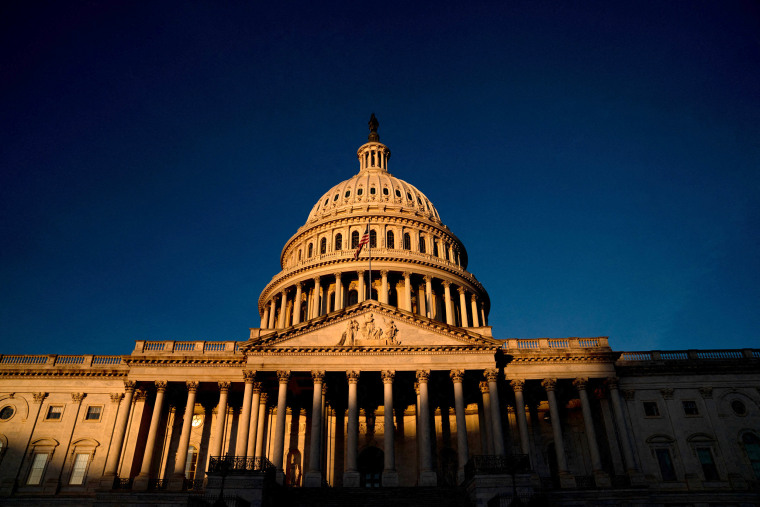WASHINGTON — Congressional leaders are closing in on a $70 billion bipartisan and bicameral deal that would expand the child tax credit and provide tax breaks for business through 2025, three sources with knowledge of the talks said.
The package, which is being negotiated by members of the Democratic-led Senate Finance Committee and the Republican-led House Ways and Means Committee, is split evenly between the Democrats’ main demand, enhancing the child tax credit, which drastically cut childhood poverty, and providing new tax incentives favored by business, which Republicans are seeking in exchange.
“It’s looking good,” Rep. Jason Smith, R-Mo., the chair of the tax-writing Ways and Means Committee, said about a potential deal.
Senate Finance Committee Chair Ron Wyden, D-Ore., said he has been pursuing the tax deal for 18 months and is aiming to complete it by Jan. 29.
“We’re homing in on a very specific target, which is to get this done in time for filing season,” he said. “And I’m going to pull out all the stops and stay at it every day.”
The emerging deal, which remains fluid, aims to provide targeted relief for needy families and multi-child families. It would boost refundable child tax credits and incrementally lift the $1,600 cap on refundable credits. It would also give tax filers the option to use previous years' incomes if that enables their access to larger benefits. Monthly child cash payments that were sent to families for six months in 2021, however, are not part of the talks.
The business breaks would revive some policies under the Trump tax cuts of 2017 that have since expired. They would allow full expensing for domestic research and development, restore the pre-2017 interest deduction, extend bonus depreciation and expand small-business expensing, the sources said.
The emerging deal is a rare attempt at major bipartisan legislating in a divided Congress that has struggled to do the basics of governing. It is also the product of aligning incentives. Democrats are eager to bring back an expanded child tax credit after having enacted a huge benefit for one year, which sharply cut child poverty before the tax credit expired in 2022, raising it again. And Republicans, who unanimously rejected the earlier child cash payments, want to deliver for their traditional business allies in an election year after having struggled to pass new laws since they retook the House.
“I’m very committed to trying to get a resolution on the tax policies,” said Sen. Mike Crapo, R-Idaho, the Finance Committee’s ranking member. “It’s very important.”
Crapo confirmed that negotiations include business tax credits and changes to the child tax credit but would not get into details.
“Negotiations are ongoing. They have been. And I’m hopeful that we’ll get to a resolution,” he said. “But there’s a lot of issues. There’s a lot of perspectives.”
The child tax provisions seek to address the fact that the refundable credit for low-income families is worth less than the refundable credit for middle- and higher-income families. For Democrats, the priority is getting the biggest possible cut in child poverty with the expanded child tax credit, one of the sources with knowledge of the discussions said.
The source said that lawmakers are 90% of the way there but that some of the major holdups center on a Democratic push for housing provisions and a Republican push for tax issues dealing with the cleanup of natural disasters.
Some prominent liberals lamented that the emerging deal would give away too many tax breaks to corporations.
“My very big concern is that it tilts the direction of our tax cuts to the biggest corporations,” said Rep. Rosa DeLauro, D-Conn., an active proponent of the child tax credit. “It puts working families, vulnerable families, middle-class families at risk."
Sen. Maggie Hassan, D-N.H., a member of the Finance Committee, defended the business provisions in a reflection of cross-party support for various items in the deal.
“It is an important step forward that we have been able to reach a strong, bipartisan deal to restore the R&D deduction along with a bipartisan, tailored expansion of the child tax credit,” Hassan said in a statement, adding that she “will keep working with my colleagues on both sides of the aisle in the Senate and the House, as well as the business community, to get this deal done.”
“I hope that Speaker Johnson and others in Republican leadership will listen to the calls from both sides of the aisle and engage on this,” she said.
Rep. Katie Porter, D-Calif., a rare single mom in Congress, said that she supports tax policies that make it easier to raise families — but that she wants to avoid “sweetheart deals” for businesses.
“I obviously strongly support the child tax credit, if it works. And what this place ought to be doing is investing in policies that work and turn the spigot of tax dollars off for policies that aren’t. So I’m heartened to hear about that,” she said. “I do not think we need to cut business any sweetheart deals in order to make it easier for Americans to raise their families.”
Sen. Sherrod Brown, D-Ohio, who is involved in the discussions, said his priority is to help families raising children.
“We’re helping to drive the child tax credit,” he said. “So it’ll be a big victory for middle-class Americans.”



